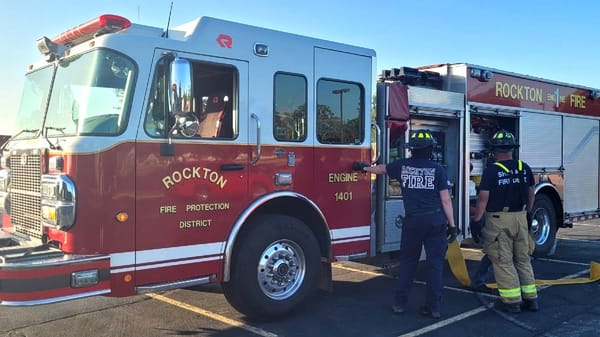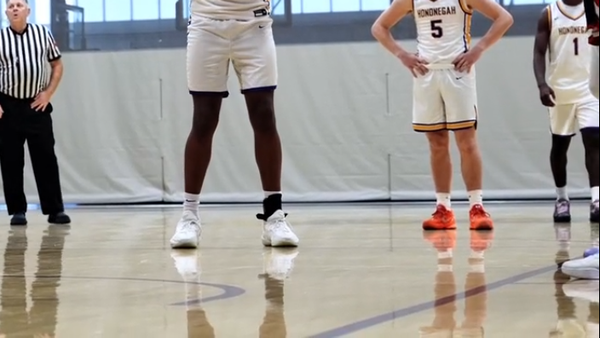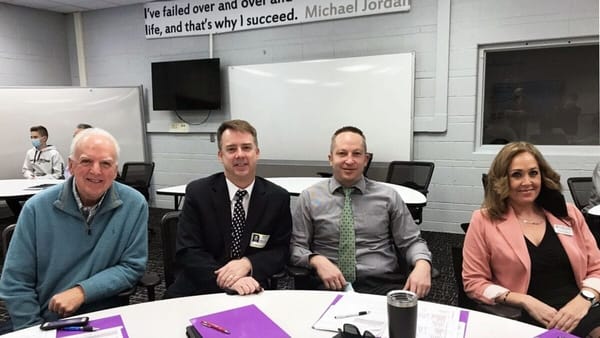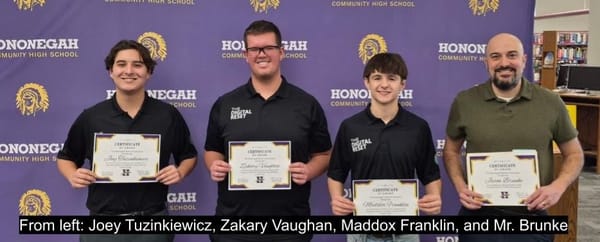Open Letter to Hononegah School Board and Superintendent Michael Dugan
The Hononegah School Board says since March they’ve been considering Dr. Ehren Jarrett as a successor to Superintendent Michael Dugan.
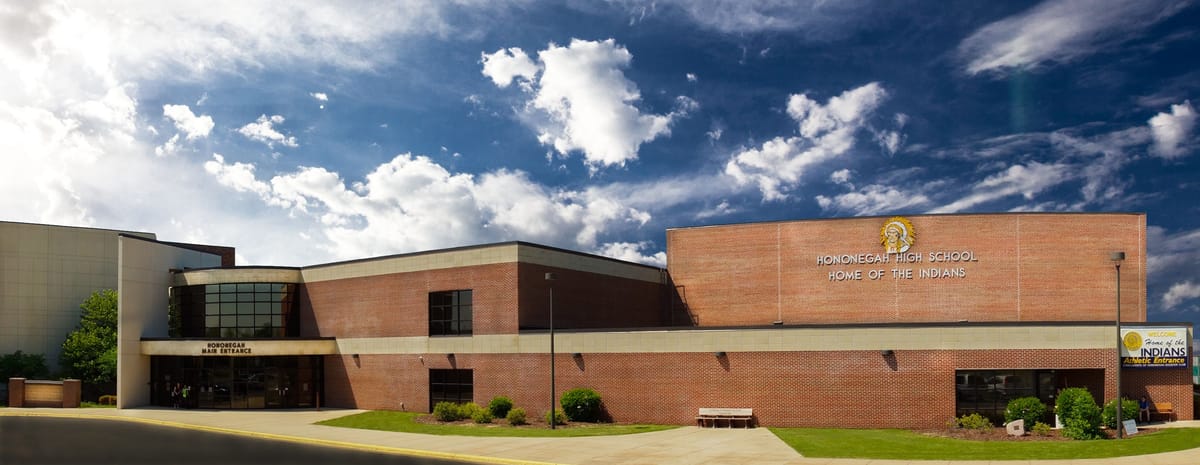
Current Hononegah Superintendent Michael Dugan will be retiring at the end of the 2025-26 school year. At its July meeting, the School Board approved Dr. Ehren Jarrett as the next superintendent beginning on July 1, 2026.
The Rockton-Roscoe News recently received a letter from Anthony Jenkins an honorably discharged former Marine, former Hononegah School Board candidate in 2023, and a twenty-five-year Hononegah District resident and concerned community member.
The Rockton-Roscoe News reached out to the Hononegah School Board and Superintendent Michael Dugan, looking for a response to the open letter. Below is Anthony Jenkins' letter. Following Anthony Jenkins' letter is the response from the Hononegah School Board.
Dear Hononegah Board of Education Members and Superintendent Michael Dugan,
I write to you as a concerned community member and former candidate for this Board. My motivation has always been to ensure our students are safe, supported, and given the best leadership possible. Today, I feel compelled to voice serious concerns about the process and decision to appoint a new superintendent for Hononegah Community High School District 207. This letter is written with the utmost respect for your roles, but also with an unwavering commitment to transparency, ethical leadership, and the well-being of our children.
Transparency Concerns in the Appointment Process
The recent superintendent selection process lacked the transparency and community input our district deserves. The announcement that the Board would immediately go into closed session to consider a single candidate – Dr. Ehren Jarrett – with a contract approval to follow in the same meeting, gave the public virtually no opportunity to learn about or weigh in on this critical decision. Such a fast-tracked approach, involving minimal public discussion or disclosure, runs contrary to the spirit of open governance. The Illinois Open Meetings Act (OMA) exists “to ensure that Illinois residents have access to their government” and to guarantee more open, accountable government. By limiting candidate review and deliberation to closed sessions and private discussions, the Board has raised red flags about compliance with these transparency laws. Even if legal technicalities were observed, the spirit of public oversight and trust in this process appears to have been overlooked.
I urge you to consider how this looks and feels to the Hononegah community. No public forums, no disclosure of how many candidates (if any) were considered, and no chance for students, parents, or teachers to hear from the finalist – all of these omissions erode public confidence. Our community should not be presented with a fait accompli on an appointment as consequential as this. Sunlight and openness are not inconveniences; they are essential for earning buy-in from those you serve. When major decisions are made unilaterally or behind closed doors, stakeholders naturally worry: What don’t we know? What voices were excluded? For a district that prides itself on community support, this opaque process is deeply concerning.
Questions Surrounding the Candidate’s Record in District 205
Beyond process issues, I have closely examined the public record of Dr. Ehren Jarrett – the candidate selected – during his tenure as superintendent of Rockford Public Schools (District 205). Dr. Jarrett is no stranger to Hononegah; in fact, he began his career here as a teacher and later principal at Hononegah High School. We respect and appreciate those roots. However, a full and candid review of his leadership in Rockford raises serious concerns that I believe the Board must address openly.
1. Student Safety and Bullying: One of the most heartbreaking incidents in District 205 occurred earlier this year when an 11-year-old middle school student, Jalyah Thompson, took her own life after reportedly enduring relentless bullying. This tragedy rocked the Rockford community and is a sobering indicator that bullying was not adequately addressed in the schools. Dr. Jarrett himself admitted that the situation was a “wake-up call” and that “we need to keep doing more” – a frank acknowledgment after a child’s death. From a leadership standpoint, this is deeply troubling. Why wasn’t enough done before a life was lost? Parents from that district have flooded school officials with complaints about unchecked bullying, feeling their children’s cries for help went unanswered until it was too late.
It is not my intent to unfairly assign blame for a tragedy. However, a superintendent’s foremost duty is to ensure student well-being and safety. We must ask: What proactive measures did Dr. Jarrett implement to combat bullying and create a safe school climate? Were those measures effective? Unfortunately, the public evidence points to systemic failures in protecting students from bullying – failures that had dire, irreversible consequences. As a community that cares deeply about each Hononegah student, we cannot gloss over this part of the candidate’s record. We need a leader who has proven strategies to prevent bullying and respond decisively when incidents occur, not one who learns only in hindsight that “more” needs to be done.
2. Discipline, Equity, and Trust: Ironically, while some students in Rockford faced insufficient protection, others experienced what civil rights groups call an overzealous and biased discipline system. In June 2024, a coalition of national civil rights organizations filed a federal complaint accusing Rockford District 205 of operating a “school-to-prison pipeline” for its minority students. The complaint alleges that Rockford schools disproportionately refer students – especially Black children – to law enforcement for school-based behavior issues. The data cited are stark: Black students in Rockford were being ticketed by police at 3.2 times the rate of their white peers. This indicates a profound equity issue under Dr. Jarrett’s leadership – one that drew national scrutiny and the prospect of a federal civil rights investigation.
Such a finding should give us pause. In an era when we strive to make schools inclusive, nurturing environments for all children, District 205 instead became a case study in racially skewed discipline and broken trust. Students of color and their families in Rockford have spoken out that they feel targeted and unsupported – that misbehavior is met with punishment or police involvement rather than help, but only for certain kids. This is not the example of equitable leadership we want to import into Hononegah. Every child here, regardless of race, deserves fair treatment and the opportunity to learn from mistakes without discriminatory punishment. If our next superintendent has a history of allowing or at least not remedying such disparities, our community must know how he plans to rebuild trust and ensure equity here.
Compounding the concern, there are also signs that District 205’s approach to discipline swung to the opposite extreme in ways that frustrated educators and possibly endangered students. Just this past school year, Rockford teachers publicly warned that a “softening” of the Student Code of Conduct under Dr. Jarrett’s tenure has led to chaos in classrooms. In one reported case, a high school student was found carrying a knife at school – a clear violation of policy – yet “nothing was done until teachers found out,” and the student ultimately received only a brief suspension, not expulsion. Teachers described feeling like they “work in a battlefield,” with frequent fights, drug use, and even weapons going largely unchecked by administrators. They characterized the situation as a “losing battle” to maintain order when serious offenses result in a mere “slap on the wrist”.
This paints a disturbing picture of inconsistency: on one hand, students of color disciplined too harshly for minor infractions, and on the other hand, truly dangerous behaviors not disciplined firmly enough. Both extremes undermine the trust of families and staff. If teachers lose confidence that district leadership will back them up on enforcing rules, and parents lose confidence that their children will be treated fairly and kept safe, the whole school climate suffers. Hononegah cannot afford a leader who cannot strike the right balance on student discipline – firmness with fairness. We need a superintendent with a clear, principled approach to school safety and equity, and it’s not evident from Rockford’s experience that we have that in this candidate.
3. Academic Performance and Outcomes: A superintendent’s record is also reflected in academic results and overall student success. Here again, the public data from District 205 are cause for concern. Rockford Public Schools, under Dr. Jarrett’s 12-year superintendency, consistently performed well below state averages on key metrics. According to the Illinois State Board of Education’s Report Card, the district’s four-year graduation rate was just 69% (as of 2023), compared to about 88% statewide. Even with recent gains touted – an uptick to around a 74% graduation rate last year – Rockford still lags far behind the state norm for getting students across the finish line. Only 17.8% of Rockford students were proficient in English Language Arts and 11.3% in Math, less than half the state proficiency rates (34.6% and 26.9% respectively). In other words, nearly 9 out of 10 students in Rockford are not meeting grade level expectations in math, and more than 4 out of 5 are not doing so in reading – stark outcomes by any measure.
Yes, these figures have seen modest improvement in the past year or two, and district leaders have pointed to bright spots (for example, Rockford saw a small increase in elementary reading scores after lengthening the school day). But the overall picture remains one of underachievement and unrealized potential. Dr. Jarrett had over a decade to improve academics in Rockford. The fact that, after all those years, the district still struggles with chronic absenteeism (nearly half of students miss 10% of the school year) and low proficiency is deeply concerning. We owe it to our own students and parents to ask: What will be different under his leadership here? Hononegah High School has long been a source of community pride; we expect our superintendent to elevate our students’ performance, not preside over decline. If anything, the data from Rockford suggests an urgent need for fresh ideas and bold reforms – the very kind of innovation that typically comes from casting a wide net in a superintendent search, not from quietly installing a long-standing insider.
4. Community Engagement and Trust: Finally, leadership is about more than policies and numbers – it’s about earning the trust of the community through openness, integrity, and genuine engagement. On this front, I worry that both the process and the candidate’s history send the wrong message. Dr. Jarrett’s impending departure from Rockford has been met with mixed reactions. Some have acknowledged positive initiatives over the years, but many in the Rockford community have voiced frustration with a lack of responsiveness from the administration on issues ranging from large class sizes to school safety. When teachers go on the record saying they feel unheard by the district office, or when parents rally because they feel their kids aren’t safe or supported, that is a sign of trust breaking down. And when such a leader is selected behind closed doors to helm our own district, it risks importing that trust deficit to Hononegah.
Already, in just the past week, I have heard from countless parents and students in our area who are bewildered by this appointment. They are asking: “Why weren’t we given a voice?” “How can we be sure this was the best we could get for our kids?” “Is our board putting personal connections ahead of our students’ needs?” These questions are circulating precisely because the selection was handled without transparency or community involvement. Trust is earned through transparency and authentic two-way communication. Unfortunately, both the selection process and Dr. Jarrett’s recent track record suggest a potential disconnect from the very people our schools serve.
A Call for an Open, Community-Informed Search
Given the serious nature of the concerns above, I respectfully call on the Hononegah School Board to pause the current appointment and reconsider its approach. This decision is simply too important to rush. Our district has an opportunity – even at this juncture – to choose a path of openness and inclusion, and in doing so, to possibly find a candidate who is the absolute best fit for Hononegah’s future.
I recommend the Board take the following actions before finalizing any superintendent contract:
• Launch a Transparent National Search: Post the superintendent position publicly and allow a reasonable application window. Cast a wide net. There are many qualified educators and administrators who may bring fresh vision and proven excellence. Hononegah deserves to compare multiple candidates side by side, including Dr. Jarrett if he chooses to remain a contender, rather than assuming one pre-selected individual is automatically the best choice.
• Engage Stakeholders in the Process: Assemble a search committee or hold public forums to gather input on what qualities and priorities the community wants in a new superintendent. Invite teachers, parents, students, and alumni to share their hopes and concerns. A series of meet-and-greet events or Q&A sessions with finalist candidates would allow the community to hear directly from those who aspire to lead our schools. This not only vets the candidates more thoroughly, it also gives the eventual appointee a stronger mandate and understanding of our community’s expectations.
• Due Diligence and Background Review: Commit to a full review of each finalist’s track record on key issues – student safety, academic performance, fiscal management, equity, community relations – using public data and reference checks.
Where there are red flags (as we have found with the current candidate), discuss them openly. For instance, if a candidate has low performance metrics or legal complaints in their history, the Board should address how it expects to support that leader in overcoming those challenges here, or whether another candidate might simply be a better choice. Do not rely solely on familiarity or past connections; rely on evidence of success and alignment with Hononegah’s values.
• Reaffirm Commitment to Transparency: As this process moves forward, adhere closely to both the letter and spirit of the Open Meetings Act. That means conducting as much Board discussion as possible in open session (not just taking a perfunctory vote in public after private deliberations). It means keeping the public informed at each step – for example, announcing how many candidates applied, the timeline for selection, and opportunities for input. It also means being honest and forthright about why a particular candidate is chosen. The community should never be left guessing about the reasoning behind leadership decisions.
Hononegah has a proud tradition of academic excellence, community support, and strong student outcomes. Our next superintendent should enhance that tradition, not put it at risk. By reopening the search process, the Board would send a powerful message that it values the community’s voice and is committed to getting this decision right. Making a thoughtful choice now will pay dividends in student success and public trust for years to come. In contrast, pushing through a controversial appointment over significant community concern could divide the district and set back our progress.
Conclusion and Personal Reflections
It is never easy to challenge a decision of a Board on which one aspired to serve. I want to make clear that my goal is not to sow discord, but to speak up for transparency, due diligence, and the students who depend on us. My family chose this community – and I chose to run for the school board – because I truly believe in Hononegah and want to see it thrive. That hasn’t changed one bit. I care deeply about the success of our schools, from the students in the classrooms to the teachers on the front lines and the administrators guiding the way. In that spirit, raising these concerns is an act of care.
I ask each of you to reflect on why you ran for the school board or chose to work in education. I suspect it was because you care about kids and believe in the power of good governance to improve lives. Those are my reasons as well. Right now, “good governance” means taking a step back and ensuring we haven’t lost sight of our core mission: providing the best possible education and environment for our students. If there’s even a shadow of doubt that the current closed process and chosen candidate fully serve that mission, then the only responsible choice is to pause and reassess.
In closing, I extend my sincere gratitude for your service and for considering this input. Hononegah is a special place with an engaged, passionate community. Let’s honor that by selecting a superintendent in a manner that reflects our values – openly, wisely, and with students at the heart of every decision. Our kids are watching, and they deserve nothing less.
Sincerely,
Anthony Jenkins
Footnotes: All factual statements in this letter are supported by publicly available data, news reports, and official records for verification. Citations are provided for transparency and accuracy, in the interest of an informed dialogue.
Prioritizing Transparency and Trust in Our Schools
Where there is no transparency, there can be no trust. And without trust, a school district cannot flourish. Recent events in our community have brought this truth home in a profound way. A local school board’s rushed, closed-door appointment of a new superintendent has left parents and students feeling voiceless. At the same time, the chosen administrator comes from a nearby district where painful incidents – an adolescent driven to suicide by bullying, allegations of racially biased discipline – have shaken public confidence. As a concerned citizen and parent, I cannot stay silent. We must demand better because our children’s well-being is on the line.
Every parent knows the feeling: sending your child off to school each morning, entrusting their safety and growth to the institution. That trust is sacred. Now imagine learning that your child’s school leadership was picked without anyone asking for your input, without a public vetting, without even a basic introduction of who this person is and what they stand for. That is exactly what just happened here. In a single meeting – with hardly any public notice – a new superintendent was effectively installed. No community forum, no nationwide search, no Q&A with the students whose lives will be most impacted. Just a quick vote after a private discussion.
This secretive process might be legal, but it isn’t right. We teach our students about democracy and accountability, yet our own school officials bypassed those ideals when it mattered most. Transparency in school governance is not some abstract nicety; it’s how we as parents and taxpayers know that decisions put students first instead of convenience or cronyism. When a major decision that affects every hallway and classroom is made in the shadows, how are we supposed to believe it was made in the community’s best interest? Trust is not a given – it’s earned through openness. Unfortunately, openness was sorely lacking here.
Making matters worse, consider who was chosen through this opaque process. The new superintendent – whose name is almost beside the point – hails from the third-largest school district in Illinois, one with a troubled recent history. Under that administration, our region witnessed a tragic “wake-up call” in early 2025: an 11-year-old girl took her own life, with her family pointing to merciless bullying at school as the cause. It’s every parent’s nightmare. In the aftermath, the outgoing superintendent spoke about the need for the “entire community to come together” and “do a better job”. Those words ring hollow when you realize that this tragedy was not an isolated incident, but a culmination of longstanding neglect of student well being. Social media channels were flooded with comments from other parents and students sharing stories of bullying that went unaddressed. One heartbreaking loss is one too many. How can we entrust our own children’s safety to a leader who had to be jolted awake by the death of a child? We need a superintendent who is proactive about anti-bullying before another precious life is lost.
Equally alarming are the issues of racial equity and discipline that have plagued the incoming superintendent’s former district. Just last year, national civil rights groups filed a complaint depicting a deeply unfair discipline system in that district. They alleged that students of color, especially Black students, were far more likely to be punished and even ticketed by police for school misbehavior than their white classmates. Imagine being a parent of a Black child and knowing that a simple mistake at school could result in a $100 ticket or a court hearing, while other kids get a pass. That is a terrifying reality – and it’s completely unacceptable. Schools should be sanctuaries of justice and support, not pipelines to the juvenile justice system. The fact that our school board’s pick for superintendent comes with this baggage is a huge red flag. How will he ensure fair and unbiased treatment for all students here, when he couldn’t achieve it there? Thus far, we’ve heard no real answer. And in the absence of answers, fear and distrust fill the void.
To be clear, this isn’t about attacking an individual—it’s about standing up for core values: transparency, accountability, and the human impact of our decisions. When those in power act without transparency, they alienate the very people they are meant to serve. And when a school leader’s track record shows a pattern of not listening to student and family needs, that leader risks exporting the same problems to a new district. We simply cannot let that happen to our children.
What do we want for our schools? It’s simple, really. We want safe kids, treated with respect and kindness. We want fair rules applied to everyone, so no child feels singled out or ignored. We want strong academics, with a leader who lifts up teachers and students to achieve their best. And we want to be partners in the process, not bystanders kept in the dark. These are reasonable expectations in a free society and a tight-knit community like ours.
So, what can be done? First, our school board should remember that they work for us – the families and citizens. They should hit pause on this hire and bring the community into the conversation. Why not open up the search and see who else is out there? Why not let us meet the candidates and share what qualities matter most to us? If the initially chosen candidate truly is the best fit, he should be able to earn our support through a transparent interview process and public forums. If he isn’t, we just might find a stellar leader whom we would have otherwise overlooked. Either outcome is better than the status quo of secrecy and resentment.
Second, any leader coming into our district must directly address the past and commit to change. If bullying has been mishandled, say so and tell us how it will be different here. If discipline was biased or inconsistent, acknowledge it and lay out a plan to ensure every student feels safe and valued in our halls. No more generic promises of “doing better” – we need concrete strategies: anti-bullying programs, better training for staff on intervention, community partnerships for mental health, a hard look at disciplinary data to fix disparities, and open-door policies so parents and students can be heard. Our kids can’t afford leadership by autopilot or public relations sound bites. They need genuine, heartfelt action.
Finally, let’s remember the bigger picture: the human impact of leadership decisions. A superintendent isn’t just an office position; it’s a person who sets the tone for every school building. When that tone prioritizes transparency, empathy, and inclusion, it trickles down to every interaction – from the school board meetings to the classroom. When that tone is absent, the void is felt as well: in frightened kids, disillusioned teachers, and a community at odds with itself. We’ve seen both sides of this coin in our region. On one side, schools that truly become the heart of their community – welcoming, empowering, unifying. On the other, schools mired in controversy – where parents are protesting outside and students feel unseen. The difference is leadership. And leadership begins with how leaders are chosen and held accountable.
This op-ed is a plea – from one concerned citizen, yes, but echoing the voices of many. We are not cynics looking to stir trouble; we are neighbors, parents, alumni, and students who know how great our schools can be when we work together. Our call is simple: Do not shut us out. Embrace transparency and collaboration, especially on decisions as monumental as who leads our school district. And demand that those leaders exemplify the values we teach our kids – honesty, responsibility, fairness, and compassion.
In the end, every child in our community is our child. Their futures are shaped by the education they receive and the environment in which they receive it. We all have a stake in getting this right. Let’s move forward with open eyes, open ears, and open hearts. Let’s insist on leaders who welcome scrutiny and partnership. Let’s build a school culture where nothing important happens behind closed doors, and where every student – regardless of background – feels safe, heard, and empowered to thrive.
Our kids are watching how we handle this moment. Let’s show them what ethical, people-centered leadership looks like. Let’s show them that in our community, when concerns are raised, we face them head-on with integrity. And most of all, let’s show them that we care – truly, deeply, always – about their lives and futures. Because at the end of the day, that’s what all of this is about.
Below is the Hononegah School Board's response to the letter from Anthony Jenkins.
Selecting a superintendent to lead the school district is one of the most challenging and important responsibilities a school board is elected to perform. Beginning last November, the Hononegah Board of Education began discussing the superintendent’s position in anticipation of current Superintendent Michael Dugan’s retirement at the end of the 2025-26 school year. The Board discussed several alternatives, one of which was a deputy superintendent position to work with Superintendent Dugan during his last year and to take over after his retirement, but the Board ultimately chose not to pursue that plan. The Board also discussed conducting a search using a search firm to come up with a candidate. Amid those discussions, in March, local media announced that Dr. Ehren Jarrett was not seeking an extension of his contract as superintendent of Rockford Public Schools District #205. It was also reported that his contract would expire at the end of the 2025-26 school year. Dr. Jarrett reached out to the Hononegah District to inquire about the upcoming vacancy. The Hononegah Board discussed the possible availability of an experienced and qualified candidate with a background at Hononegah. Dr. Jarrett had previously been at Hononegah as a highly regarded classroom teacher, associate principal and principal for a period of 9 years before becoming RPS #205’s assistant superintendent for two years and then superintendent for 13 years. Discussions about the possibility of Dr. Jarrett’s becoming Mr. Dugan’s successor continued. In May, Dr. Jarrett met with the Hononegah Board for an interview. Ultimately, the Board agreed that Dr. Jarrett’s experience and familiarity with Hononegah made him the ideal successor to Mr. Dugan. At its July Board meeting, Dr. Jarrett was approved as the next superintendent of Hononegah Community School District #207 beginning on July 1, 2026.
Hononegah CHSD #207 Board of Education.
Illinois law gives school boards the authority to hire a superintendent, but the process must follow certain state requirements. The Illinois School Code (105 ILCS 5/10-16.7) grants boards the power to make the appointment, and the Illinois Open Meetings Act (5 ILCS 120/2) allows candidate discussions in closed session but requires the final vote to be taken in public.
The Illinois Association of School Boards recommends, but does not require, steps such as publicly announcing the vacancy, gathering community input, and interviewing multiple candidates.
Districts may also set their own search procedures in board policy, which, if in place, must be followed in addition to state law.
The board voted in public on July 16th, 2025, to approve the superintendent contract, in accordance with the Illinois Open Meetings Act (5 ILCS 120/2) , which requires final actions to be taken in open session. While the vote met legal requirements, some residents have voiced concerns about how the process was handled. Rockton resident Anthony Jenkins outlined his perspective in an open letter sent to the Rockton-Roscoe News, which can be read above.
Any questions regarding the Hononegah School Board should be brought up during the Public Comment (This is the time in which we invite the public to address the school board with issues and concerns. In the interest of giving everyone time, we ask you to limit your comments to five minutes. Also, we will not tolerate personal attacks or inappropriate language. If you are interested in making a comment, please stand and state your name.)
Hononegah School Board meeting times and dates can be found on the Hononegah High School website where the School Board has a webpage - https://www.hononegah.org/school-board-home-home

